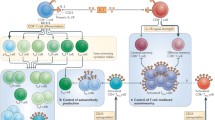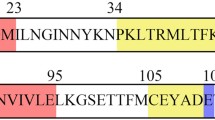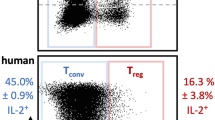Abstract
For years, medical researchers have striven to develop selective immunotherapies that could specifically ameliorate pathogenic immune responses without immunocompromising the patient. Blockade of many known receptors on T cells can inhibit the initiation of immune responses. However, this approach is problematic in that it is not possible to predict the onset of disease in patients. Current immunotherapies are unsatisfactory for the sporadic exacerbating type of diseases such as multiple sclerosis and inflammatory bowel disease (IBD), because they require either long-term treatment or acute treatment with high-dose immuno-suppressants. With regard to this issue, the inducible and inflammatory site-specific molecule, inducible costimulator (ICOS), may be particularly useful as an ideal targeting molecule for the strategy of treatment of human IBD patients.
Similar content being viewed by others
References
Podolsky DK. Inflammatory bowel disease. N Engl J Med 1995; 325:928–37.
Fiocchi C. Inflammatory bowel disease—etiology and pathogenesis. Gastroenterology 1998;115:182–205.
Fuss IJ, Neurath M, Boirvant M, Klein JS, de la Motte C, Strong SA, et al. Disparate CD4+ lamina propria (LP) lymphokine secretion of IFN-γ, whereas ulcerative colitis LP cells manifest increased secretion of IL-5. J Immunol 1996;157:1261–70.
Parronchi P, Romagnani P, Annuziato F, Sampognaro S, Becchio A, Giannarini L, et al. Type 1 T-helper cell predominance and interleukin-12 expression in the gut of patients with Crohn’s disease. Am J Pathol 1997;150:823–32.
Hammer RE, Maika SD, Richardson JA, Tang YP, Taurog JD. Spontaneous inflammatory disease in transgenic rats expressing HLA-B27 and human b2m: an animal model of HLA-B27-associated human disorders. Cell 1990;63:1099–112.
Watanabe M, Ueno Y, Yajima T, Okamoto S, Hayashi T, Yamazaki M, et al. Interleukin 7 transgenic mice develop chronic colitis with decreased interleukin 7 protein accumulation in the colonic mucosa. J Exp Med 1998; 187:389–402.
Sadlack B, Merz H, Schorle H, Schimpl A, Feller AC, Horvak I. Ulcerative colitis-like disease in mice with a disrupted interleukin-2 gene. Cell 1993;75:253–61.
Kuhn R, Lohler J, Rennick D, Rajewsky K, Muller W. Interleukin-10-deficient mice develop chronic enterocolitis. Cell 1003;75:263–74.
Mombaerts P, Mizoguchi E, Grusby MJ, Glimcher LH, Bahn AK, Tonegawa S. Spontaneous development of inflammatory bowel disease in T cell receptor mutant mice. Cell 1993;75:275–82.
Powrie F, Leach MW, Mauze S, Menon S, Caddle LB, Coffman RL. Inhibition of Thl responses prevents inflammatory bowėl disease in scid mice reconstituted with CD45Rbhi CD4+ T cells. Immunity 1994;l:553–62.
June CH, Bluestone JA, Nadler LM, Thompson CB. The B7 and CD28 receptor families. Immunol Today 1994;15:321–31.
Chambers CA. The expanding world of co-stimulation: the two-signal model revised. Trends Immunol 2001;22:217–23.
Coyle AJ, Gutierrez-Ramos JC. The expanding B7 superfamily: increasing complexity in costimulatory signals regulating T cell function. Nat Immunol 2001;2:203–9.
Perrin PJ, June CH, Maldonado JH, Ratts RB, Racke MK. Blockade of CD28 during in vitro activation of encephalitogenic T cells or after disease onset ameliorates experimental autoimmune encephalomyelitis. J Immunol 1999;163:1704–10.
Tada Y, Nagasawa K, Ho A, Morito F, Ushiyama O, Suzuki N, et al. CD28-deficient mice are highly resistant to collagen-induced arthritis. J Immunol 1999;162:203–98.
Nakazawa A, Watanabe M, Kanai T, Yajima T, Yamazaki M, Ogata H, et al. Functional expression of costimulatory molecule CD86 on epithelial cells in the inflamed colonic mucosa. Gastroenterology 1999;117:536–45.
Chambers CA. The expanding world of co-stimulation: the two-signal model revisited. Trends Immunol 2001;22:217–23.
Hutloff A, Dittrich AM, Beier KC, Eijaschewitsch B, Kraft R, Kroczek RA. ICOS is an inducible T-cell co-stimulator structurally and functionally related to CD28. Nature (Lond) 1999; 397:263–6.
Yoshinaga SK, Whoriskey JS, Khare SD, Sarmiento U, Guo J, Horan T, et al. T-cell co-stimulation through B7RP-1 and ICOS. Nature (Lond) 1999;402:827–32.
Mages HW, Hutloff A, Heuck C, Buchner K, Himmelbauer H, Oliveri F, et al. Molecular cloning and characterization of murine ICOS and identification of B7h as ICOS ligand. Eur J Immunol 2000;30:1040–7.
Tamatani T, Tezuka K, Hanzawa-Higuchi N. AILIM/ICOS: a novel lymphocyte adhesion molecule. Int Immunol 2000;12: 51–5.
Peach RJ, Bajorath J, Brady W, Leytze G, Greene J, Naenura J, et al. Complementarity determining region 1 (CDR1)- and CDR3-analogous regions in CTLA-4 and CD28 determine the binding to B7-1. J Exp Med 1994;180:2049–58.
Coyle AJ, Lehar S, Lloyd C, Tian J, Delaney T, Manning S, et al. The CD28-related molecule ICOS is required for effective T cell-dependent immune responses. Immunity 2000;13:95–105.
McAdam AJ, Chang TT, Lumelsky AE, Greenfield EA, Boussiotis VA, Duke-Cohan JS, et al. Mouse inducible costimulatory molecule (ICOS) expression is enhanced by CD28 costimulation and regulates differentiation of CD4(+) T cells. J Immunol 2000;165:5035–40.
Dong C, Juedes AE, Tamann UA, Shresta S, Allison JP, Ruddle NH, et al. ICOS co-stimulatory receptor is essential for T-cell activation and function. Nature (Lond) 2001;409:97–101.
Tafuri A, Shahinian A, Bladt F, Yoshinaga SK, Jordana M, Wakeham A, et al. ICOS is essential for effective T-helper-cell responses. Nature (Lond) 2001;409:105–9.
McAdam AJ, Greenwald RJ, Levin MA, Chernova T, Malenkovich N, Ling V, et al. The ICOS molecule is critical for CD40-mediated antibody class switching. Nature (Lond) 2001; 409:105–9.
van Dullemen HM, van Deventer SJ, Hommes DW, Bijl HA, Jansen J, Tygat GN, et al. Treatment of Crohn’s disease with anti-tumor necrosis factor chimeric monoclonal antibody (cA2). Gastroenterology 1995;109:129–35.
Targan SR, Hanauer SB, van Deventer SJ, Mayer L, Present DH, Braakman T, et al. A short-term study chimeric monoclonal antibody cA2 to tumor necrosis factor alpha for Crohn’s disease. Crohn’s Disease cA2 Study Group. N Engl J Med 1997;337:1029–35.
Present DH, Rutgeerts P, Targan S, Hanauer SB, Mayer L, van Hogezand RA, et al. Infliximab for the treatment of fistulas in patients with Crohn’s disease. N Engl J Med 1999;340:1398–405.
Scallon BJ, Moore MA, Trinh H, Knight DM, Ghrayeb J. Chimeric and TNF-alpha monoclonal antibody cA2 binds recombinant transmembrane TNF-alpha and activates immune effectors functions. Cytokine 1995;7:251–9.
Author information
Authors and Affiliations
Rights and permissions
About this article
Cite this article
Kanai, T., Totsuka, T., Tezuka, K. et al. ICOS costimulation in inflammatory bowel disease. J Gastroenterol 37 (Suppl 14), 78–81 (2002). https://doi.org/10.1007/BF03326419
Published:
Issue Date:
DOI: https://doi.org/10.1007/BF03326419




